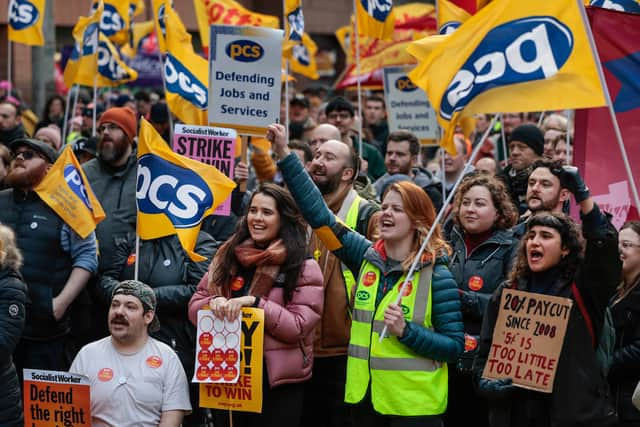Civil servants vote for six more months of 'high-profile disruptive' strike action after 'insulting' pay offer
and live on Freeview channel 276
The UK's biggest civil service union has threatened "high-profile disruptive action" unless ministers put more money on the table, after members voted to renew their mandate to keep taking industrial action for the next six months.
The Public and Commercial Services union (PCS) announced on Wednesday (10 May) 88% of members who voted were in favour of ongoing industrial action, paving the way for strikes to continue for most of the rest of the year. The union has been embroiled in a bitter row with the government for months, and has held a series of strikes affecting the Border Force, Passport Office and HMRC.
Advertisement
Hide AdAdvertisement
Hide AdAmong those who voted ‘Yes’ are members working in the Home Office, Passport Office and DVLA, and those working as driving examiners, the union said.
PCS general secretary Mark Serwotka said: “This vote shows our members will not tolerate being treated worse than anyone else in the public sector... It sends a very strong signal to the government that they must get round the negotiating table immediately."
PCS members "kept this country running during the pandemic", he said, and deserved to be treated better by their employer. “Unless ministers put more money on the table, they will see more high-profile disruptive action over the summer, leading into autumn.”


This comes after more than 130,000 civil servants walked off the job on 28 April, after the government announced that pay rises would be limited to 4.5% to 5%. The Public and Commercial Services union (PCS) described the pay announcement as an “insult”.
Advertisement
Hide AdAdvertisement
Hide AdPCS members in 132 government departments will be taking industrial action today in a long-running dispute over pay, jobs and conditions.
Mark Serwotka, general secretary of the PCS, claimed ministers were “bullying” civil servants.
He said: “When you look at how badly ministers treat their own staff, it’s impossible not to think this is an ideological war on civil servants.
PCS members have been taking strike action for months over pay, jobs, pensions and conditions. The last strike took place to increase the pressure on the government as members were offered a 2% to 3% pay increase.
Advertisement
Hide AdAdvertisement
Hide AdMembers of the PCS union have been calling for a 10% pay rise, better pensions, job security and no cuts to redundancy terms.
Mike Clancy, general secretary of Prospect, said: “We have repeatedly offered to engage in pay talks aimed at resolving this dispute, provided they followed a comparable approach to that employed elsewhere in the public service. By publishing the pay control, the government has abandoned its staff to further real terms cuts and to remain at the back of the public service pay queue.
“This industrial action was entirely avoidable, but the gvernment’s failure to bring anything to the table has made it inevitable and it leaves hard-working civil servants with no option but to protest over their treatment.”
He added: “If the government doesn’t change its stance, then it will face a recruitment and retention crisis that degrades the Civil Service and the public services we all rely on.”
Advertisement
Hide AdAdvertisement
Hide AdPCS general secretary Mark Serwotka said the pay offer will only “anger PCS members” and “increase the likelihood of a new wave of sustained strike action”.
Mr Serwotka added: “Unlike the health and education unions that have had intensive talks leading to improved pay offers, we were given no opportunity to negotiate – it’s the most deplorable way to treat their own staff.
“The government has carried on as if there hasn’t been the biggest industrial action in a decade, if this has been a normal year.
The government previously said the union’s demands would cost an "unaffordable £2.4bn" and urged earlier strikes to be called off.
Advertisement
Hide AdAdvertisement
Hide AdA spokesperson had said the government’s focus was to "ease the pressure on households across the country" as the cost of living soars.
Teachers, junior doctors, rail workers and London Underground tube drivers are some of the industries whose workers have walked out in disputes over the last year mainly over pay - as wages do not align with the rising cost of living.
One of the biggest days of strikes was whilst Chancellor Jeremy Hunt delivered his spring Budget with workers congregating around Westminster.
Comment Guidelines
National World encourages reader discussion on our stories. User feedback, insights and back-and-forth exchanges add a rich layer of context to reporting. Please review our Community Guidelines before commenting.